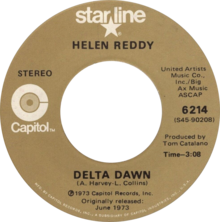
Tanya Denise Tucker is an American country music singer and songwriter who had her first hit, "Delta Dawn", in 1972 at the age of 13. During her career Tucker became one of the few child performers to mature into adulthood without losing her audience; she had a streak of top-10 and top-40 hits. She has had several successful albums, several Country Music Association award nominations, and hit songs including 1973's "What's Your Mama's Name?" and "Blood Red and Goin' Down", 1975's "Lizzie and the Rainman", 1988's "Strong Enough to Bend", and 1992's "Two Sparrows in a Hurricane". Tucker's 2019 album While I'm Livin' won the Grammy Award for Best Country Album, and "Bring My Flowers Now" from that same album won Tucker a shared songwriting Grammy for Best Country Song.

"The Rose" is a pop song written by Amanda McBroom. Bette Midler made the song famous when she recorded it for her 1979 film The Rose, in which it plays during the closing credits. It has been recorded multiple times, including by Conway Twitty and Westlife who had US Country & Western and UK number one hits with the song, respectively. Nana Mouskouri recorded a German version, also in 1980, as well as an English version.
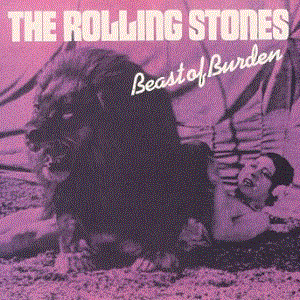
"Beast of Burden" is a song by the English rock band the Rolling Stones, featured on the 1978 album Some Girls. In 2004, Rolling Stone magazine ranked the song No. 435 on their list of "The 500 Greatest Songs of All Time".

"Boogie Woogie Bugle Boy" is a World War II jump blues song written by Don Raye and Hughie Prince which was introduced by The Andrews Sisters in the Abbott and Costello comedy film, Buck Privates (1941). The Andrews Sisters' Decca recording reached number six on the U.S. pop singles chart in the spring of 1941 when the film was in release. The song is ranked No. 6 on Songs of the Century. Bette Midler's 1972 recording of the song also reached the top ten on the U.S. Billboard Hot 100.
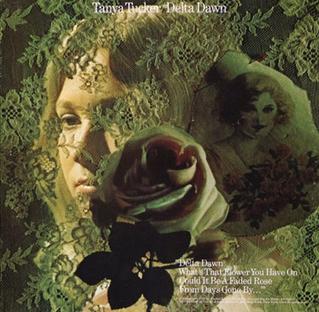
Delta Dawn is the debut studio album by American country music singer Tanya Tucker. It was released on September 11, 1972, by Columbia Records. The album was produced by Billy Sherrill and includes two top ten singles, "Delta Dawn" and "Love's the Answer"/"The Jamestown Ferry".

"Do You Want to Dance" is a song written by American singer Bobby Freeman and recorded by him in 1958. It reached number No. 5 on the United States Billboard Top 100 Sides pop chart and No. 2 on the Billboard R&B chart. Cliff Richard and the Shadows' version of the song reached No. 2 in the United Kingdom in 1962, despite being a B-side. The Beach Boys notably covered the song in 1965 for their album The Beach Boys Today!. Retitled "Do You Wanna Dance?", their version reached No. 12 in the United States. A 1972 cover by Bette Midler with the original title restored reached No. 17.
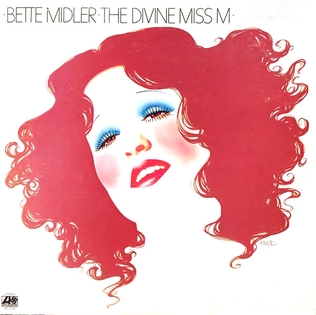
The Divine Miss M is the debut studio album by American singer and actress Bette Midler, released in 1972 on the Atlantic Records label. The title of the album refers to Midler's famous stage persona. The album was co-produced by Barry Manilow, and includes several songs that since have become repertoire standards, such as "Do You Want to Dance?", "Chapel of Love", "Hello In There", "Friends" and "Boogie Woogie Bugle Boy". It was released on CD for the first time in 1990. A remastered version of the album was released by Atlantic Records/Warner Music in 1995. A remastered deluxe edition was released in October 2016.
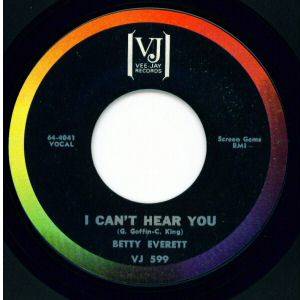
"I Can't Hear You No More" is a composition written by Gerry Goffin and Carole King. It was originally recorded as "I Can't Hear You" in 1964 by Betty Everett. The most successful version was the 1976 top 40 single by Helen Reddy.

"Under the Boardwalk" is a pop song written by Kenny Young and Arthur Resnick and recorded by the Drifters in 1964. It charted at number four on the Billboard Hot 100 chart on August 22, 1964. The song has since been covered by many other artists, with versions by Bette Midler, Sam & Dave, the Tom Tom Club, the Rolling Stones, Billy Joe Royal, The Beach Boys, Bruce Willis, Bad Boys Blue, John Mellencamp and Lynn Anderson all charting in the United States or overseas. The song ranked number 487 on Rolling Stone's list of The 500 Greatest Songs of All Time in 2004 and number 489 in 2010.
"The Happiest Girl in the Whole USA" is a country and pop music song written, composed, and recorded by Donna Fargo. It is written in the voice of a newlywed girl, sung to her new husband. It has since become her signature song.

“Soul Song” is a song written by George Richey, Billy Sherrill and Norro Wilson and first recorded by Tanya Tucker as a track for her 1972 debut album Delta Dawn.

The Best of Bette is a compilation album by American singer Bette Midler, released on the K-tel label in Australia and New Zealand in 1981. The album was the second compilation to use the title The Best of Bette, the previous version with different cover art and an entirely different track list having been released on the Atlantic Records label in both the UK, Continental Europe, Scandinavia, Australia and New Zealand in 1978.

"Leave Me Alone " is a 1973 song written and first recorded by American singer-songwriter Linda Laurie. It was famously covered by Australian-American singer Helen Reddy several months later; Reddy's cover was a million-selling, Gold-certified hit single.
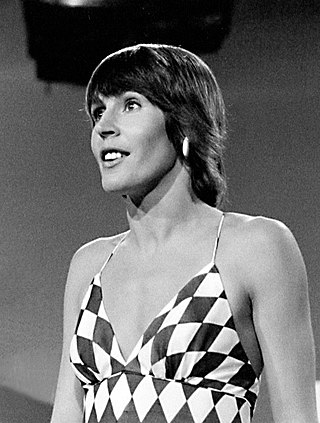
Australian-American singer Helen Reddy (1941–2020), often referred to as the "Queen of 70s Pop", recorded 18 studio albums, seven of which have achieved sales of 500,000 units in the US for which they were awarded Gold certification by the Recording Industry Association of America. One of those seven, I Am Woman, eventually went Platinum by reaching sales of one million copies, and her first compilation album, Helen Reddy's Greatest Hits, was awarded Double Platinum status in 1992 for hitting the two million sales mark. The respective US and Canadian album charts in Billboard and RPM magazine each had appearances by 10 of these LPs during the 1970s.

Long Hard Climb is the fourth studio album by Australian-American pop singer Helen Reddy, released on July 23, 1973, by Capitol Records and, aside from its primary focus on Top 40-friendly material, had her trying out New Orleans jazz and the English-language version of a recent Charles Aznavour standard. It debuted on Billboard's Top LP's & Tapes chart in the issue dated August 11, 1973, and reached number eight during its 43 weeks there, and in Canada's RPM magazine it peaked at number 14. On September 19 of that year, the Recording Industry Association of America awarded the album with Gold certification for sales of 500,000 copies in the United States. On July 22, 2003, it was released for the first time on compact disc as one of two albums on one CD, the other album being her 1972 release I Am Woman.
Thomas Alexander Harvey was an American singer, songwriter, author, actor, and radio host.
"The Jamestown Ferry" is a song composed by Bobby Borchers and Mack Vickery. It was originally recorded and released as a single by American country artist, Tanya Tucker. The track was issued as a double A-side single in conjunction with "Love's the Answer" in October 1972. The singles both reached the top five of the American country chart and the top of the Canadian country chart. It was also included on Tucker's debut album called Delta Dawn.
"I Believe the South Is Gonna Rise Again" is a song written by Bobby Braddock, and recorded by American country music artist, Tanya Tucker. It was released in December 1974 and reached the top 20 of the American country songs chart. It was the third and final single from Tucker's third studio album Would You Lay with Me .
"Spring" is a song written by John Tipton, recorded by American country music artist, Tanya Tucker. It was released in May 1975 and reached the top 20 of the American and Canadian country songs charts. It was among Tucker's final singles released by the Columbia label. It was the first single from her compilation album You Are Beautiful.
"Greener Than the Grass (We Laid On)" is a song written by David Allan Coe, and recorded by American country music artist, Tanya Tucker. It was released in October 1975 and reached positions on the North American country songs charts. It was among Tucker's final singles released by the Columbia label.

